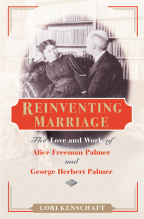|
||
      |
Peer Review ::
Open Book
Reinventing Marriage (University of Illinois Press, 2005) by Lori Kenschaft
 In
1882 Alice Freeman Palmer arrived at Wellesley College as the country’s
first female college president. She was 27. Ten years later she became founding
dean of women at the University of Chicago, where she played a critical
role in shaping coeducational higher learning. As the wife of Harvard philosophy
professor George Herbert Palmer, she struggled to balance her professional
success with married life nearly a generation before most educated women
considered combining the two. Lori Kenschaft’s Reinventing Marriage
discusses this early modern relationship and examines 19th-century gender
roles, both within and outside of the educational setting.
In
1882 Alice Freeman Palmer arrived at Wellesley College as the country’s
first female college president. She was 27. Ten years later she became founding
dean of women at the University of Chicago, where she played a critical
role in shaping coeducational higher learning. As the wife of Harvard philosophy
professor George Herbert Palmer, she struggled to balance her professional
success with married life nearly a generation before most educated women
considered combining the two. Lori Kenschaft’s Reinventing Marriage
discusses this early modern relationship and examines 19th-century gender
roles, both within and outside of the educational setting.
Kenschaft wanted to explore how heterosexual expression of love, sexuality, and intimacy has changed over time, she told the Magazine. Her interest in the Palmers, she said, began when she “realized their relationship was a turning point in Americans’ experiences and expectations of marriage.”—B.E.O.
Excerpted from Reinventing Marriage:
Most of Chicago’s trustees and administrators considered coeducation an intrinsically risky experiment and were very wary of charges of sexual impropriety. Many also felt that the East’s social norms did not apply in the West, which increased their anxiety and their vigilance. Alice’s assistant, Marion Talbot, reported that guests often left receptions not just with forks and spoons and party decorations, but also with personal belongings from students’ rooms. Alice herself referred to the university community as ‘the great unwashed’ and marveled at its social contrasts: ‘the crudest, most barbaric students in the Divinity School, and the most accomplished men in the Faculty, charming and earnest women, and students who don’t seem to have changed their linen since they came.’